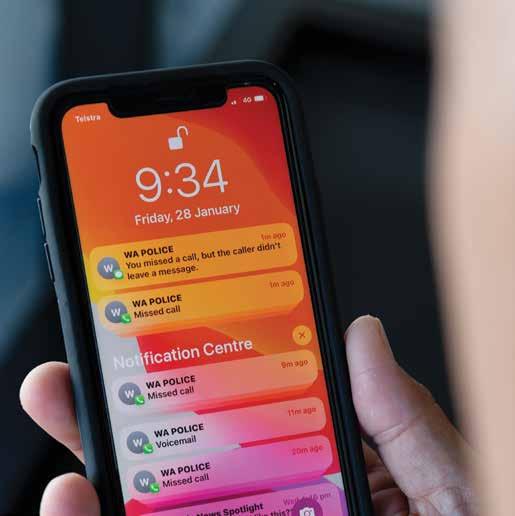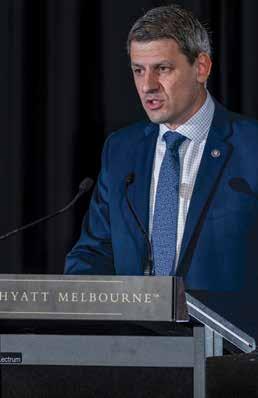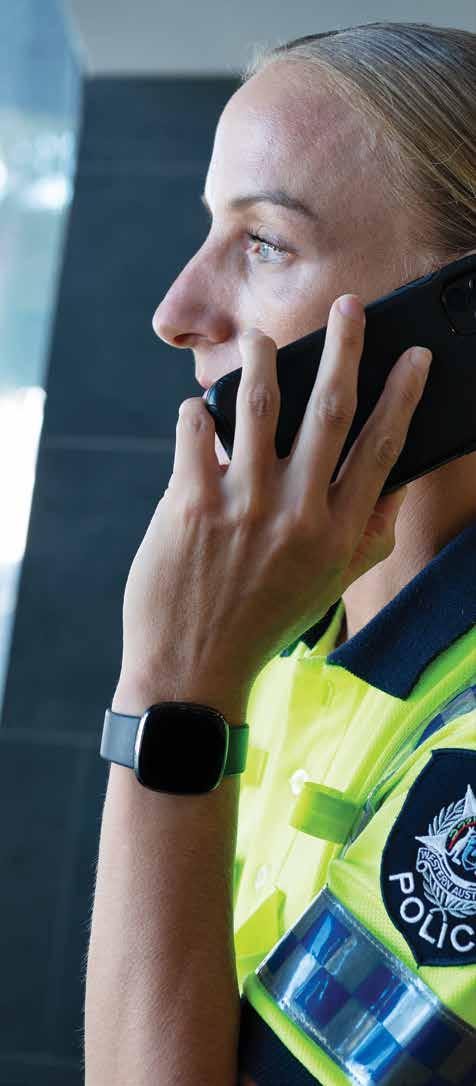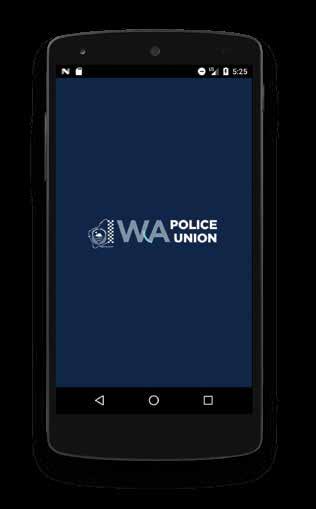
27 minute read
PRESIDENT’S REPORT
MICK KELLY
President
Advertisement
The three Rs our members need, want and demand
REMUNERATION. RESOURCES. RESPITE. They’re the three Rs about which the delegates at our P&N Bank-sponsored 85th Annual Conference spoke most frequently, most fervidly and most forcefully. They’re the three Rs that’ll permeate the log of claims we’ll develop ahead of the first round of bargaining talks about a new industrial agreement. They’re the three Rs our members need, want and demand.
Good annual conferences set good agendas for the subsequent 12 months. They provide clarity as to what matters. Our conference did just that. The message is clear: our members need, want and demand more remuneration, more resources and more respite.
Less than three weeks after our annual conference rose, the McGowan Government unveiled its new public sector wages policy following on from its 2021-22 state budget. The government’s two-year policy offers our members a 2.5% wage increase annually and the choice by industrial agreement of a one-off $1,000 payment or an extra 0.25% annually for negotiated reforms. Additionally, the government has developed a new, broader framework that’ll allow us and other unions to discuss a wider range of workplace issues.
One need only browse the industrial agreements of other WA public sector workers, particularly those in the emergency services sphere, to note significant disparities between their shift penalties, overtime rates and allowances and those of our members. Our members are getting a raw deal compared to other emergency service providers.
The McGowan Government is wedded to its public sector wages policy, and unfortunately, it may be an immovable object for us and our fellow unions in the short term. The government will likely argue it can’t afford to dig deeper into its pockets for all WA’s public sector employees and its two slightly different offers exceed wage growth in the state’s private sector. Fortunately, there’s more to remuneration than an across-the-board pay rise at a rate that’s below what several annual conference motions directed us for which to lobby.
Annual conference delegates devoted much airtime to shift penalties, overtime rates and on-call allowances. They’re three of the remuneration topics around which we should be able to prosecute cases capable of not only influencing the powers that be but also striking a chord with the people whom we serve. The Productivity Commission 2022 Report on Government Services included a key finding that, for the second year in a row, the WA Police Force had Australia’s highest satisfaction rating from people who’d experienced contact with the agency. It’s crucial we engage with the public. The public value our members. The public wouldn’t swap places with our members. The public elect the powers that be, at least those answerable at the ballot box, who remunerate our members.
One need only browse the industrial agreements of other WA public sector workers, particularly those in the emergency services sphere, to note significant disparities between their shift penalties, overtime rates and allowances and those of our members. Our members are getting a raw deal compared to other emergency service providers.
From the urban jungle of the Northbridge precinct to the rural wilderness of the WA outback, our members are crying out for more resources to help them enforce the law, prevent crime and manage emergencies. The Productivity Commission 2022 Report on Government Services found the level of WA sworn officers in an operational role fell below the national average for the first time since 2014-15, the percentage of WA sworn officers in an operational role is at its lowest since 2007-08 and the WA Police Force’s annual expenditure increase over the past five years of 0.9% is one-quarter that of the Australian mean. Those statistics, a couple of which admittedly have something to do with the COVID-19 pandemic, support what our members are telling us.
Human resources are only one part of the resources equation. The WA Police Force is responsible for policing the world’s largest single police jurisdiction, serving and protecting more than 2.5 million people who live on a land area of more than 2.5 million square kilometres. Providing officers with good reasons to not only move to regional towns but also remain in the bush beyond their tenures is essential for the well-being of our members who police those regions and the WA Police Force as a whole. The Government Regional Officer Housing program is a constant cause of complaint among our non-metropolitan members, and it requires a radical overhaul.
Being a police officer is one of the most stressful and dangerous occupations in our society. Our members are taught to run towards danger, not away from it. The highpressure environments in which our members work is a major contributory factor to the suicides data that we cited in the December edition of Police News. A quick refresher, not least for the WA Police Force executives who’ve done nothing in this space since August’s suicide prevention forum: the rate of suicide among serving Australian police officers has more than doubled over the past 20 years. At the turn of the century, serving Australian police officers were three times more likely to die in the line of duty than by their own hand. Today, the opposite is true. That’s why our members are desperate for more respite.
The Western Australia Police Force Industrial Agreement 2021 increased the rest days of our members to three a year. The WA Police Force put five rest days on the table during negotiations for a now-inactive industrial agreement, so we’ll revisit that when we sit down to talk with the agency. Also on the agenda will be the right to disconnect, which we view as vital to the health and welfare of our members.
What’s the right to disconnect? How would it work in practice? Why should you, our members, care about it? Hopefully, the cover story of this edition of Police News answers these questions and more.
PRESIDENT'S REPORT

BLURRED LINES
“When I joined the police force 27 years ago, you’d only receive an out-of-hours call from your boss about something that was really significant, such as if your gun were missing from the armoury.
“It was a world in which mobile phones weren’t commonplace, computers were little more than word processors and people would think nothing of telling you off for disturbing their private lives.
“Nowadays, everyone’s got a direct line to everyone else, whether that’s by calling, texting or emailing. Consequently, we’ve relaxed our communication protocols, society has undergone cultural changes and people are more open to their colleagues contacting them away from work. We’ve developed a culture of always being on duty.
“What would’ve been a note in my locker in 1995 would be a text to my mobile when I’m off duty in 2022. The right to disconnect gives us permission to manage what’s become the societal norm and culturally acceptable. It’s not the norm, and it’s not acceptable.”
Those are the words of Wayne Gatt, who utilised the negotiation skills he honed upholding the right as a Victoria Police sergeant to broker the inclusion of a right-to-disconnect clause in the Victoria Police (Police Officers, Protective Services Officers, Police Reservists and Police Recruits) Enterprise Agreement 2019 as Secretary of The Police Association Victoria (TPAV), our Garden State equivalent.
The right to disconnect refers to the right of employees to disengage from their work and not receive or answer any work-related calls, texts or emails outside their agreed working hours.
Technological developments and mobile devices have enabled employees to perform their work anywhere and at any time. While there are benefits with this flexible approach, it risks eroding the barriers between work time and leisure time. In many workplaces, there’s also an implicit or explicit expectation to check messages at home and at night, as well as during holidays. This constant connection and ensuing lack of rest carry important psychosocial risks for employees, including anxiety, depression and burnout.
The right to disconnect establishes boundaries around the use of employer-to-employee communications outside rostered working hours. It’s often looked upon as an individual right of the employee to not only disconnect but also not be reprimanded for failing to connect or rewarded for constantly staying connected.
France was the birthplace of the right to disconnect. In 2016, the Valls Government passed a labour law that, among other provisions, included the right to disconnect (le droit de la déconnexion). While the 2016 labour law confirmed the right to disconnect, it’d been a 2004 judgement of the Court of Cassation that had introduced the concept to French policy makers. France’s highest court found an employee’s failure to answer his work phone outside his agreed working hours wasn’t a valid reason for his employer to fire him.
The right to disconnect is codified into article L224217 of France’s Labour Code. The code doesn’t define its implementation, leaving employers and employees to determine the arrangements that best suit their respective needs. Indeed, article L2242-17 simply requires annual negotiations between employers and employees to determine the limits between the latter’s work lives and personal lives. However, French authorities take the right to disconnect seriously, as a 2018 Court of Cassation ruling that an employee is entitled to extra pay whenever they’re asked to be available to take work-related calls outside their rostered working hours shows. The court ordered the French arm of pest control company Rentokil Initial to pay €60,000 in compensation to its former regional director.
Different countries have taken different approaches regarding right-to-disconnect policies. For example, Italy, Ireland and Spain have followed France’s lead, each introducing legislation that grants employees the right not to respond to work-related communications outside their agreed working hours without the fear of penalty. In Germany, it’s companies that have shown the greatest initiative, with chief executives of many German organisations, including Daimler, Siemens and Volkswagen, negotiating with unions about what policies to implement to ensure employees feel able to disconnect. ▷


There are multiple ways for employers to implement and enforce a right to disconnect. Some employers encourage disconnection but don’t monitor it. Some employers engage in regular status checks and employee questionnaires. Some employers use technological solutions, including shutting down their company’s email servers at the end of the formal working day, although that’s an extreme case.
While Mr Gatt and his TPAV colleagues, both directors and staff, were developing their union’s log of claims for the Victoria Police (Police Officers, Protective Services Officers, Police Reservists and Police Recruits) Enterprise Agreement 2019, it became clear the members whom they represent coveted something more than money. They wanted Victoria Police to respect their downtime.
“Most out-of-hours contacts employers make to employees are contacts of convenience, not essentiality. Even in policing, the majority of matters can wait until the next shift,” said Mr Gatt.
“We canvassed our members, both face to face at branch meetings and through electronic surveys, and while they wanted more money in their pay packets, what they wanted most of all was the right to disconnect from their high-pressure work lives because all the money in the world is useless if you’re not alive to spend it.”
Initially, TPAV’s negotiators received a frosty reception from their Victoria Police counterparts whenever they discussed incorporating a right to disconnect in the Victoria Police (Police Officers, Protective Services Officers, Police Reservists and Police Recruits) Enterprise Agreement 2019. It took quite some time before Victoria Police warmed to the idea, but eventually, the employer saw its merit.
“Any provision like this gets the hackles up of the powers that be. At first, it was met with alarm from Victoria Police chiefs. However, we argued the always-on-duty culture they oversaw was killing people slowly and they should do something about it. We proposed a right to disconnect we believed would create not only a less stressed workforce but also a more resilient workforce,” said Mr Gatt.
Operational since April 2020, the Victoria Police (Police Officers, Protective Services Officers, Police Reservists and Police Recruits) Enterprise Agreement 2019 contains the following clause: 59. Right to disconnect outside of effective working hours for protective services officers, constables, senior constables, sergeants and senior sergeants 59.1 Supervisors and managers must respect employees’ periods of leave and rest days. 59.2 Other than in emergency situations or genuine welfare matters, employees must not be contacted outside of the employee’s hours of work unless the employee is in receipt of an availability allowance pursuant to clause 56. 59.3 Employees are not required to read or respond to emails or phone calls outside their effective working hours.
Deb Day is uniquely positioned to assess the right to disconnect because it came into effect near the end of her 33-year Victoria Police career, just before she joined TPAV as a field officer.
Ms Day, whose husband is a Victoria Police homicide detective, was a senior sergeant and officer in charge prior to leaving the force to work for our sister union. She embraced the right to disconnect from the moment the Fair Work Commission registered the Victoria Police (Police Officers, Protective Services Officers, Police Reservists and Police Recruits) Enterprise Agreement 2019 and it became law.
“I had to have my work-life balance right for my family to function. You can’t have a work-life balance if your employer is continually ringing you, emailing you, texting you when you’re on your rest days because you meant to be focusing on other things,” said Ms Day.
“When the clause came in, I was over the moon because it made it easy for me to disconnect. When I’d leave the office, I’d turn off my work phone. Sometimes I’d leave my work phone on my desk, so when people would ring my phone, it’d ring out in the office, and they’d leave a message. The out-of-office message on my emails would say I’m disconnected. The people who’d need to speak with me in the event of a crisis had my personal mobile phone number.
“My out-of-office message was important because it meant people weren’t calling me on my rest days to ask low-level questions or advise me about stuff I didn’t need to know there and then.”
Now as a TPAV staff member, Ms Day spends her professional life assisting Victoria Police officers with employment-related matters, including educating all ranks about the right to disconnect.
“A vast number of our contacts from officers is about managers breaching the agreement and contacting them while they’re at home. They don’t want it, they’re annoyed with it, and they reach out to us because they want something done about it,” said Ms Day.
“So, it’s part of a big education piece for us to remind managers of the right-to-disconnect clause and that unless it’s an emergency, they shouldn’t contact officers who are on rest days or leave.
“The education piece also includes the officers who are at home. Every frontline officer is issued with an Apple iPad Mini as part of their operational kit. They can take these devices home, and they do take them home. They check their work emails on them and then ring us to complain about the content of those messages. We implore them to stop checking their work emails at home when they should be disconnecting from their stressful jobs.”
Mr Gatt agrees with Ms Day that TPAV, Victoria Police and their respective members and employees are learning together.
“Is the right-to-disconnect clause working? It won’t work all the time and there are areas of grey. But it’s not designed to be an overnight switch that’s going to alter three decades of change. It’s designed to reduce the intrusions and help the employer, Victoria Police, and its employees, our members, get to a good place,” said Mr Gatt.
“Now’s not the best time to assess the impact of the rightto-disconnect clause because we’re responding to what’s a one-in-a-100-year emergency, but there are definitely fewer unnecessary communications despite the challenges associated with COVID-19.
“Our members are becoming more knowledgeable about the right to disconnect, more literate about the issues and more comfortable with pushing back. They’re on a journey, and so are their bosses.”
A right-to-disconnect clause like the one active in Victoria is near the top of our industrial agenda, and last year, Chris Dawson APM, Commissioner of Police, committed to engaging with us about such a policy during the term of the Western Australia Police Force Industrial Agreement 2021, which is due to expire in June.
Mick Kelly, President of the WA Police Union, is passionate about the right to disconnect and how it’d benefit the entire WA police family.
“The right to disconnect goes beyond recognising employees shouldn’t be contacted whatever the time. The right to disconnect not only removes the need for an immediate response from employees but also protects them against any detriment for being unreachable. Instead of managers simply not expecting a response from workers outside the latter’s rostered working hours, workers are actively encouraged not to respond outside those hours,” said Mr Kelly.
“The right to disconnect can benefit both individual employees and organisations as a whole. Establishing an effective worklife balance for employees is likely to reduce staff burnout and overload, leading to a more productive workforce. The reduced pressure may have further benefits such as higher staff retention rates and increased employee morale, as well as a feeling from employees their employer recognises and support their mental health.
“The right to disconnect is the right thing to do for all employers, including the WA Police Force, which care about their employees.” ■
13
It’s OK not to be OK
An open letter to officers struggling with PTSD
In May 2021, Sergeant Graeme Porteous walked out the front door of his house with the intention of taking his own life. Exhausted from years of battling post-traumatic stress disorder (PTSD), Sgt Porteous felt he’d nothing left.

Nine hours later, emergency services, including the WA Police Force, found Sgt Porteous in a drunken stupor, luckily before he’d achieved his objective.
One year on from the darkest day in Sgt Porteous’s life, he’s penned an open letter to Police News, which he hopes will convince his troubled brothers and sisters in blue to get the help he was so reluctant to seek.
Our members are taught to run towards danger, not away from it and the high-pressure environments in which our members work is a major contributory factor to the data we cited in December’s Police News.
Over the past 20 years, the rate of suicide among serving Australian police officers has more than doubled. In the second half of the past decade, the rate of suicide among serving Australian police officers increased significantly more than among their American, British and French counterparts. At the turn of the century, serving Australian police officers were three times more likely to die in the line of duty than by their own hand. Today, the opposite is true.
Read Sgt Porteous’s open letter and call out for help if you need it. Hello everyone. My name is Graeme Porteous, and I’m in my 40th year of policing, which includes 31 years on the WA Police Force’s frontline.
The job has changed significantly since I joined in 1982. It was far more regimented back then than it is today. We were told, very early in our careers, to keep what happens at work, at work. We were to tell no one, not even our wives or families. It’s advice I followed religiously for decades.
Back in the old days, alcohol was the preferred method of dealing with stress. I saw many colleagues develop an unhealthy overreliance on alcohol. Marriages were ruined. Work hard, play hard was the catchcry. I wasn’t a big drinker in the 1980s, but that changed over time.
Like you, I’ve enjoyed many postings, both country and metropolitan, in various roles. Like you, I’ve witnessed many unpleasant, confronting and disturbing incidents. More than some. Fewer than others. The deaths of three colleagues as a result of PTSD and two colleagues who lost their lives while on duty haunt me.
I always considered myself to be a resilient person. I was enthusiastic and gregarious in nature. I had a positive outlook on work and life in general. I had a great job, a great wife and three great kids. What else is there?
That all changed sometime around 2000 when I started experiencing odd flashbacks of things long past. Unhelpful memories were being propelled to the forefront of my mind. It would happen at any time of the day or night. Images randomly popped into my head. I couldn’t make sense of it. I began experiencing night terrors, which woke me regularly, disturbed my sleeping patterns and eventually impacted my general health and well-being. Like many others, I turned to alcohol to help manage my symptoms and deteriorating mental health. Doctor-prescribed medicines followed.
In the early 2000s, lots of people, both inside and outside the WA Police Force, started talking about PTSD. I considered it as a legitimate ailment for defence personnel, but not so much for police officers. Generally speaking, I wasn’t sure I believed in it for coppers. From my experience, officers suffering from stress-related illnesses were widely viewed with scepticism and adversely judged by colleagues and supervisors, including me.
Upon reflection, I accept I was ignorant of the reality of PTSD.
As my sleep deprivation increased, my mood fluctuated, and my emotional regulation decreased. The cumulative effect was my sick leave increased, my motivation decreased, my outlook on life turned entirely negative, my joyful experiences largely disappeared, and my relationships crumbled.
In 2012, I had my first breakdown, and a WA Police Force psychiatrist diagnosed me with PTSD. Initially, I refused to accept my diagnosis. I tried to shun it. I tried to bury it. I continued trying to manage it with a combination of alcohol and prescription medicines, which by this time included psychiatric pills. I was a reluctant participant, often refusing to take my medicines because they reminded me how broken I was.
This approach didn’t work out well for me. My mood swings became extreme and common. My lows were terrible. My depression was rampant, and then anxiety kicked in. It was a horrible time. All the while putting on a fake cheerful face to hide my inner turmoil and despair. I felt embarrassed and ashamed for not being able to beat it. I thought I should be able to beat it. Everyone else wasn’t like this. I was struggling with emotional dysregulation, exploding at work for no reason, incapable of controlling my outbursts. Often irritable and angry, I viewed myself as a fraud, showing one facade to everyone but in the shadow of that entity, hiding the vulnerable, bewildered and overwhelmed person I’d become. Self-doubt, self-loathing and self-condemnation were places I frequented.
Ever-present were memories of friends who’d taken their lives because of PTSD and their frustrations at the ever-changing medicines doctors prescribed to stabilise their moods. I was scared I’d end up like them.
To cope, I continued self-medicating with alcohol, which wasn’t good. All the while, my treating psychiatrist was experimenting with my meds to find the right fit. As you’d expect, due to my reluctance to accept I had a problem, my condition worsened, and I became somewhat antisocial. I preferred my own company because it was easier than pretending to be OK when with others. I became disassociated with life, a passive onlooker, not an active participant. I felt emotionally numb. My relationship with my wife was strained. She felt like she was walking on eggshells around me. It was as hard on her as it was on me. Probably harder. My anxiety was out of control, and I became hypervigilant. I couldn’t relax. I was tired and fatigued. I couldn’t sleep more than two or three hours in a row.
I was struggling at work. I couldn’t concentrate. My memory was failing me. I was easily confused. I began acting in unsafe ways. My general health was suffering. I was putting on weight and regularly attending emergency departments with high blood pressure. I was neither happy nor healthy.
I was constantly battling embarrassment, shame and guilt. I felt everything was my fault or a product of my failure to self-manage my problems. I should simply get over it, as I was once told. Man up and get over it. I did try, but I couldn’t. Suicidal ideation was always there. Self-condemnation is an unrelenting and vicious adversary. At times, my struggles felt insurmountable. My negative thoughts and self-doubts were extremely hurtful and fatiguing. I was trapped in a cyclic temporal argument with myself about my sense of self-worth and my right to happiness.
Even though many people surrounded me, I felt isolated, completely alone. My loss of self-esteem. My sense of failure. My personal weakness. It was the continual killing off of my once resilient, emotional spirit, bit by tiny bit. As I was trying desperately to hold it together, I felt like people who didn’t understand – couldn’t understand – were looking at me like I was crazy. Frankly, it felt like I was going crazy. I had an implacable, insidious and invisible enemy, and it felt like it was slowly breaking me apart from the inside. My inner struggle was constant and emotionally exhausting. No matter how much I rested, I felt fatigued. My enjoyment of life evaporated, replaced by a shallow sense of surviving, day by day. My depression manifested itself as anger, frustration and resentment, mainly directed inwards at my inability to beat my demons. I felt fragile and vulnerable.
Last May, I finally fell over. Completely. Totally. I endured a psychiatric meltdown. I could tell it was coming. That rainy afternoon in May, I experienced the most severe bout of depression I’d ever felt, and I yielded. The fight had simply left me. I was done. Defeated. My strength had disappeared. I wanted it over. I wanted out. It was all too hard.
I was totally exhausted from my prolonged battle against myself. Years upon years of internal torment. I saw no way out of the fatigue, despair and self-hatred. I was overwhelmed by the sheer enormity of it all. I saw no light at the end of any tunnel. I saw no respite. I knew I was loved. I was surrounded by people who cared for me, but I felt completely and utterly alone. I thought my loved ones would be better off without me and my flaws, so I took a bottle of whisky and some rope into the bush opposite my house. In my absence, my family notified the relevant authorities, and emergency service providers, including the WA Police Force, undertook a largescale search operation. The search crew found me nine hours after I’d left home. Totally inebriated, I was unable to walk unaided. Thankfully, I was still alive. I was lucky. My excess consumption of alcohol put me in such a state, I couldn’t complete the task I’d set myself. ▷


Respite in a private mental health facility followed. Differing medicines, psychiatric counselling and cognitive behavioural therapy have helped my personal growth in better managing my health conditions. I’ve reduced my alcohol intake significantly – I’d estimate by about 90% – and I feel much healthier. My sleeping patterns are more consistent, and my night terrors are less frequent. I still feel fatigued and experience moderate mood swings, but nothing like before. I still don’t like socialising generally, which is something I suspect is due to embarrassment and shame.
I’ve written this open letter because of the amazing and unconditional support I’ve received from loved ones, close personal friends, work colleagues, direct line managers and the WA Police Force as a whole. I’ll be forever grateful and humbled by the non-judgemental support I’ve received during my recovery. My secret is now out in the open. Strangely, my sense of embarrassment and failure has diminished. It still pops into my head occasionally, but on the whole, it’s been replaced by a sense of achievement in surviving what could’ve been a catastrophic mistake.
During my recovery, it was excruciating to witness the despair, pain and suffering of my loved ones. I carry with me significant guilt for the pain I inflicted on them. I never want to see anyone else go through the emotional distress the persons closest to me went through. This letter is meant for anyone battling their own demons. Help is there. You just need to ask for it. You’re not alone. I understand better than most people the reasons why we hesitate in requesting help, but it’s out there for you.
In 2016, The Conversation Australia and New Zealand published a piece by Petra Skeffington, Head of Psychology, Exercise Science, Chiropractic and Counselling at Murdoch University, in which the then Curtin University-based doctor wrote the risk of PTSD in Australian police was as high as 20%, far beyond the 1-3% prevalence expected in the general population. It’s food for thought. Given my experience, I’d suggest PTSD is actually underreported within the WA Police Force. If there’s anyone out there struggling, silently fighting their own fight, please seek help. There are people you can trust. If all else fails, give me a call or send me an email. I’m always up for a chat. I know what it is to surrender to overwhelming emotions. Every fight is winnable. You just need the right support.
I’m not saying PTSD is curable. Am I cured? No. But, with help, PTSD is manageable. It’s challenging. It’s confronting. It’s tough. But it’s doable.
A wise man said to me at the recent funeral of a mutual friend, who was also a serving officer, you recover step by step, placing one foot in front of the other. Will I ever stumble again? Possibly, but I derive comfort from knowing I’m not alone and there’s help available. It’s OK to be human and need help occasionally. What I’ve seen, heard and touched during work hours has, on occasions, confronted, scared and scarred me. The scarring isn’t the danger. The reluctance to seek help when needed is the danger.
It’s OK not to be OK. I know it’s a corny line, but it’s true. I used to treat R U OK? Day with contempt, viewing it as a political tool designed to protect the WA Police Force against civil suits. That mentality is completely wrong. It’s there to remind everyone that not everyone is OK, and that it costs nothing to be kind. I’m hopeful sharing my story through Police News will encourage others to take the all-important first step of asking for help.
Stay safe everyone.
Kindest regards Sergeant Graeme Porteous ■
24/7 MENTAL HEALTH SERVICES
BEYOND BLUE
1300 22 4636
LIFELINE
13 11 14
SUICIDE CALL BACK SERVICE
1300 659 467
WA POLICE FORCE EMPLOYEE ASSISTANCE PROGRAM
1300 687 327
WA POLICE UNION PHONE APP
Free download from the App Store or Google Play








